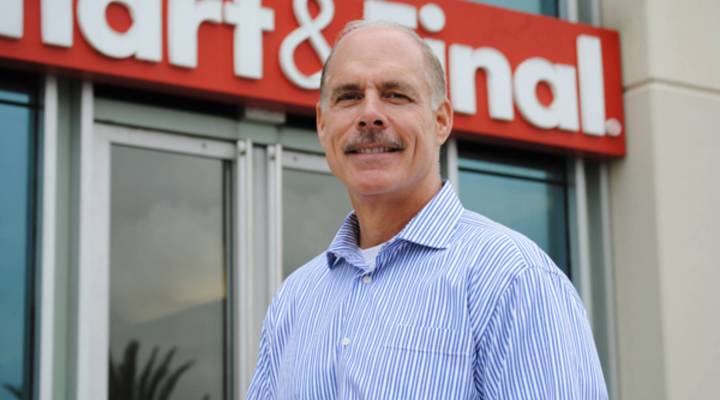
Business customers help Smart & Final thrive in weak economy
Business customers help Smart & Final thrive in weak economy

Kai Ryssdal: The idea we had when we decided to come down here to Commerce was to go from small business to large with a stop along the way in the credit markets to see how the downgrade and Wall Street — and mostly the real economic weakness that’s out there — are being felt. So we had Vincent and his small business from across the street.
Dave Hirz’s business is also based here. But it’s a big-name company. He’s the president of the warehouse grocery store chain Smart & Final. If you’ve ever stocked up maybe for a party or big to-do needing snacks and drinks, you’ve probably shopped there. Dave, thanks for coming by.
Dave Hirz: Glad to be here, Kai.
Ryssdal: So I said retail in a reluctant economy. Is that what you’re seeing?
Hirz: I am. But really, on the Smart & Final side of the ledger, sales are actually very good.
Ryssdal: How good? Are you setting records?
Hirz: We’re setting records. In fact, in the months of June and July we had three record weeks within a five-week period.
Ryssdal: All right, not to be a downer here. But after good things, bad things do come. What are you ready for? What are you expecting the second half of the year?
Hirz: We actually have re-forecasted the second half of the year and it’s a far more optimistic than our original projection. In fact, right now we’re putting together our business plan for 2012 and we’re optimistic going into 2012.
Ryssdal: How can that be? What’s going on at Smart & Final that you’re not feeling this?
Hirz: We’re a little unique. We have about 234 stores and we see about a million-and-a-half customers every week. But a third of those are small businesses, small restaurants, veterinarians — people that come to us for our large sizes, that type of thing. About two-thirds are household customers. So we see different things there. The business customer, in particular, has been in our mind feeling much better here in the last six months than before. The household customer — we’re a EDLP, everyday low price operator — and people are looking for price and we think that that’s why we’re growing.
Ryssdal: So are we getting into a situation then where you guys in the EDLP category — which is a new phrase for me, never heard of that — you guys are doing well and the really high end is doing well, and people in the middle are getting squeezed?
Hirz: I would tell you that alternative classes of trade — like us and other alternative classes of trade — appear to be doing much better than, say, conventional grocery stores. Yes.
Ryssdal: Yeah. So let me ask you this, I had the CEO of GM on the phone the other day — we’re going to run that interview in a couple of weeks — and I said to him, you’re running a major industrial company in this country, how do we get out of this? And so I put now the same question to you — different business category, same fundamental question.
Hirz: Yeah. Again, a lot of it really relates to consumer confidence and how are they really feeling. But I tell you, particular business customers are feeling much better than they were a year ago. A year ago, our business customers weren’t buying two and three of items. They were really careful with how much they were buying in one trip. My average sale per customer — with the business customer — has gone up dramatically. They’re feeling better about their business and they’re no longer worried about losing their business. They’re actually pretty optimistic.
Ryssdal: Are you doing so well that you’re expanding and hiring?
Hirz: Oh we are definitely hiring. With the kind of sales growth that we have — pushing double digits — we’ve definitely been hiring all year long this year and plan to do additional hiring in the future.
Ryssdal: The president met with CEOs either yesterday or the day before, I forget, talking specifically about jobs and what the government can do. What do you want to see? What do you think policy ought to be that’s going to get more jobs into this economy?
Hirz: I think that everybody ought to be concerned about government spending. I think that’s the crux of the problem, but it really comes down to consumer confidence — and consumers being able to have confidence that the unemployment rate [will] drop and have confidence that they’re going to keep the job they have today.
Ryssdal: Yeah, but very quickly, how do you create jobs if you’re President Obama?
Hirz: I think you have to reduce spending, I think you have to lower taxes, I think you have to let small businesses continue to thrive. That’s where the growth is going to come from. It’s going to come from the small businesses that we help to support.
Ryssdal: When?
Hirz: Soon. Soon.
Ryssdal: All right. Dave Hirz, the president of Smart & Final. Thanks so much for coming out today, Dave.
Hirz: Thank you, Kai.
There’s a lot happening in the world. Through it all, Marketplace is here for you.
You rely on Marketplace to break down the world’s events and tell you how it affects you in a fact-based, approachable way. We rely on your financial support to keep making that possible.
Your donation today powers the independent journalism that you rely on. For just $5/month, you can help sustain Marketplace so we can keep reporting on the things that matter to you.


















